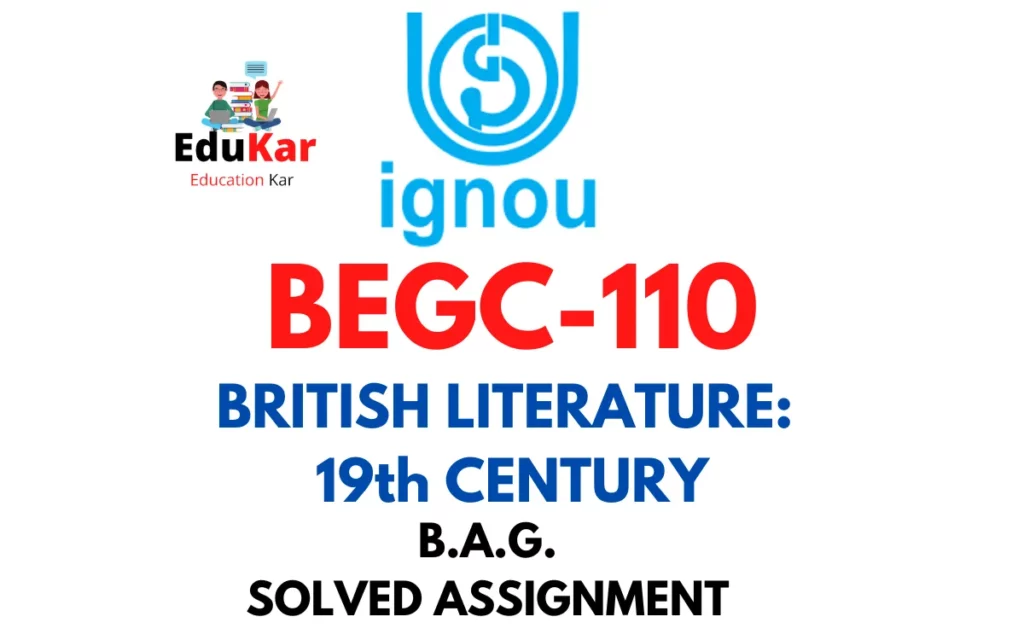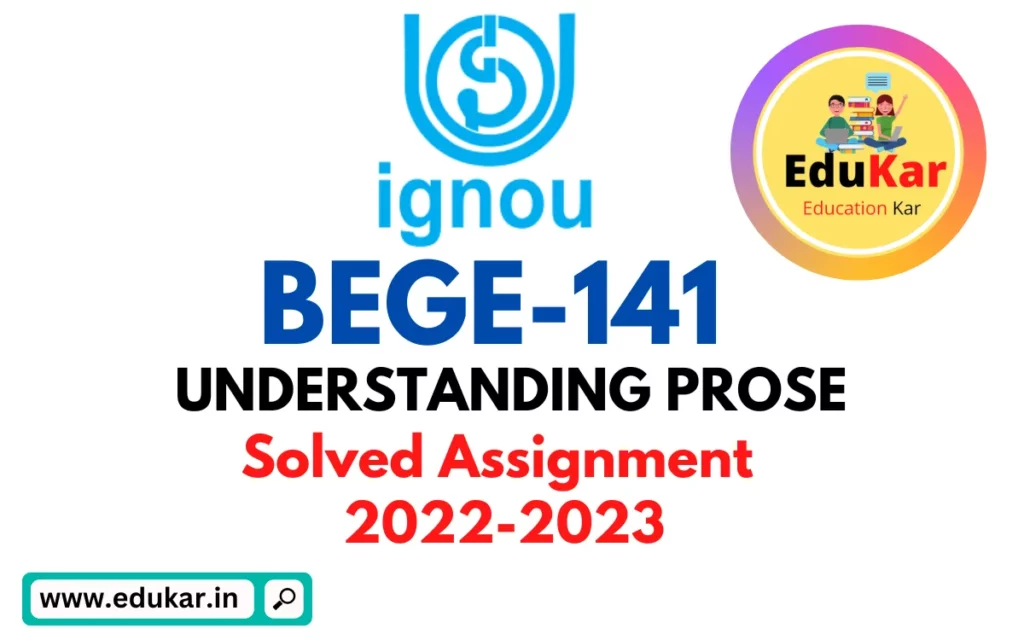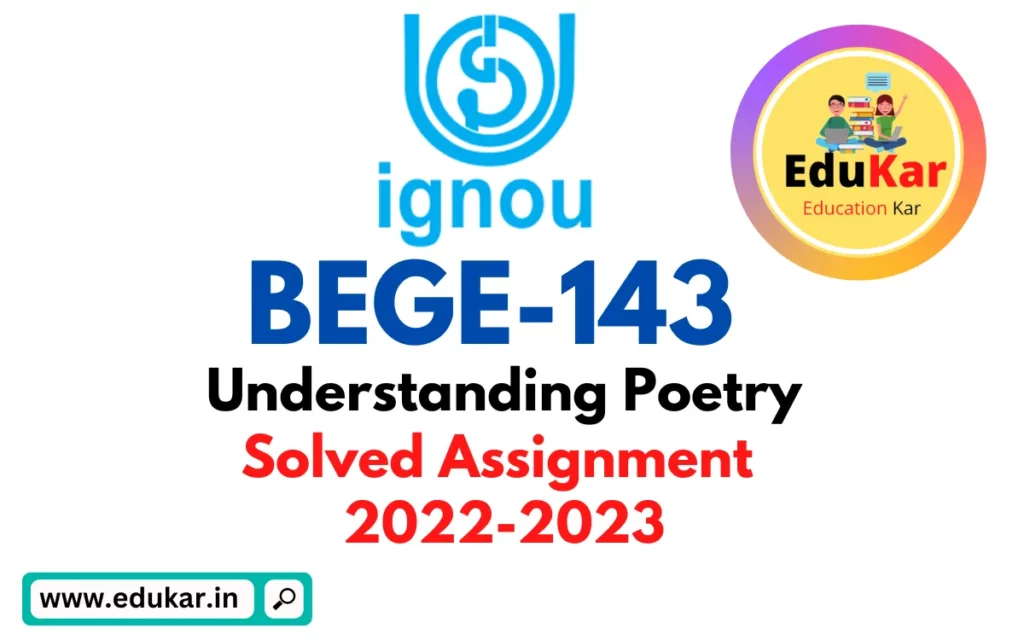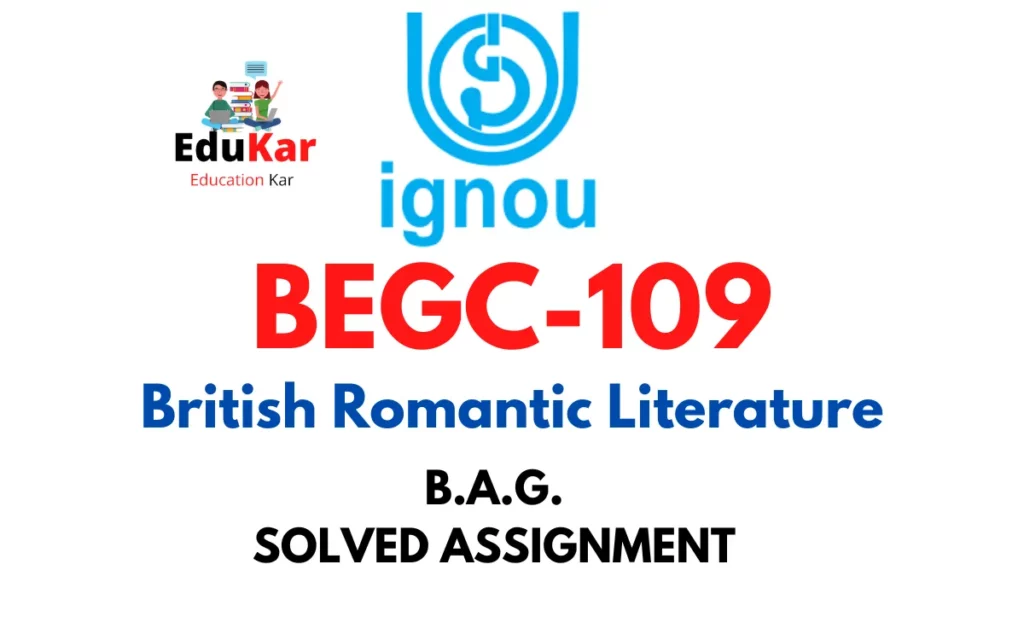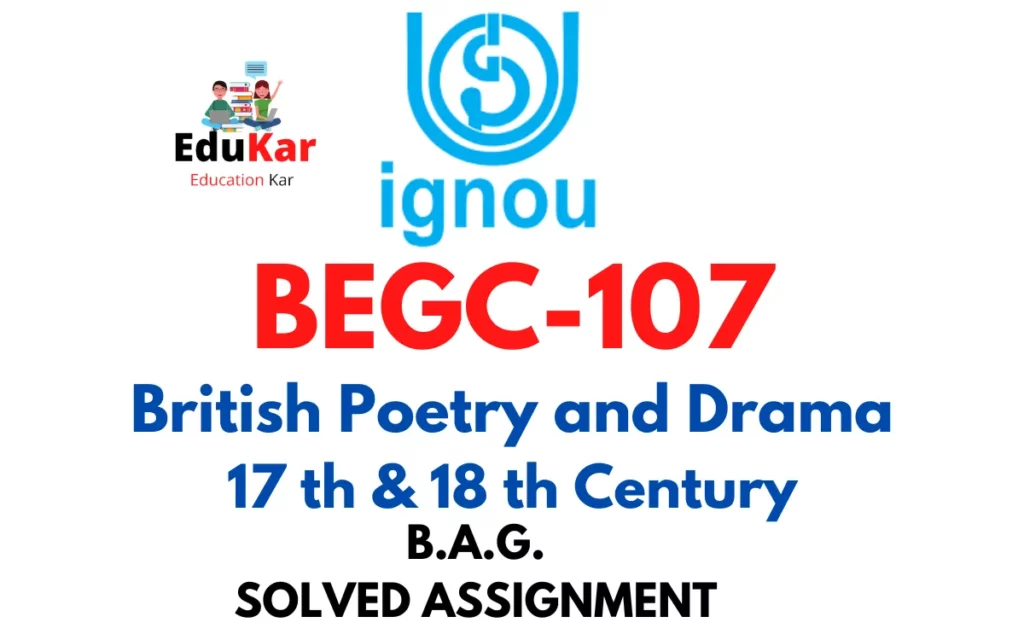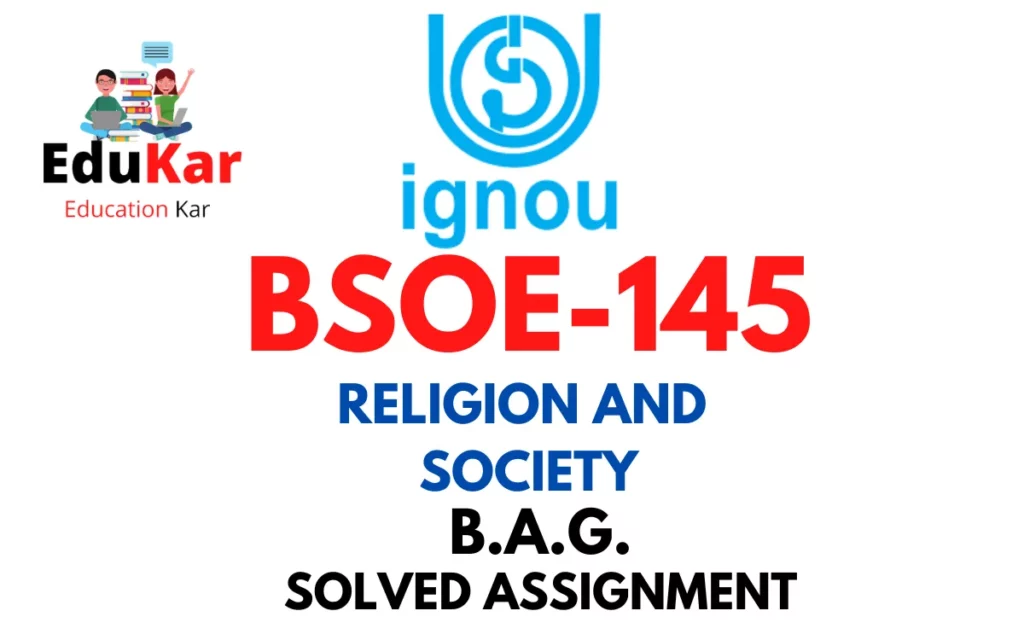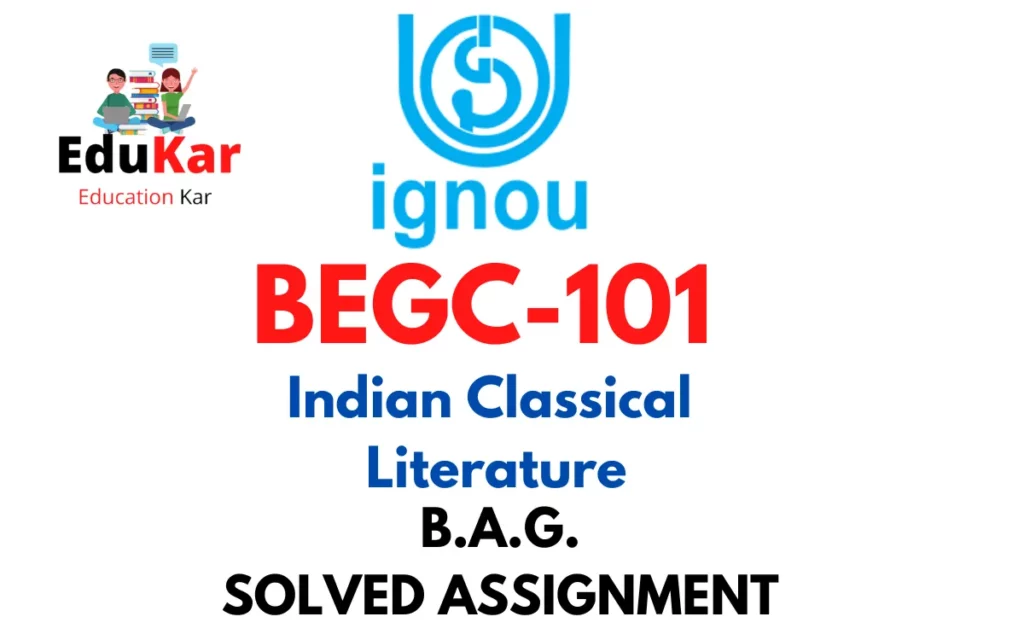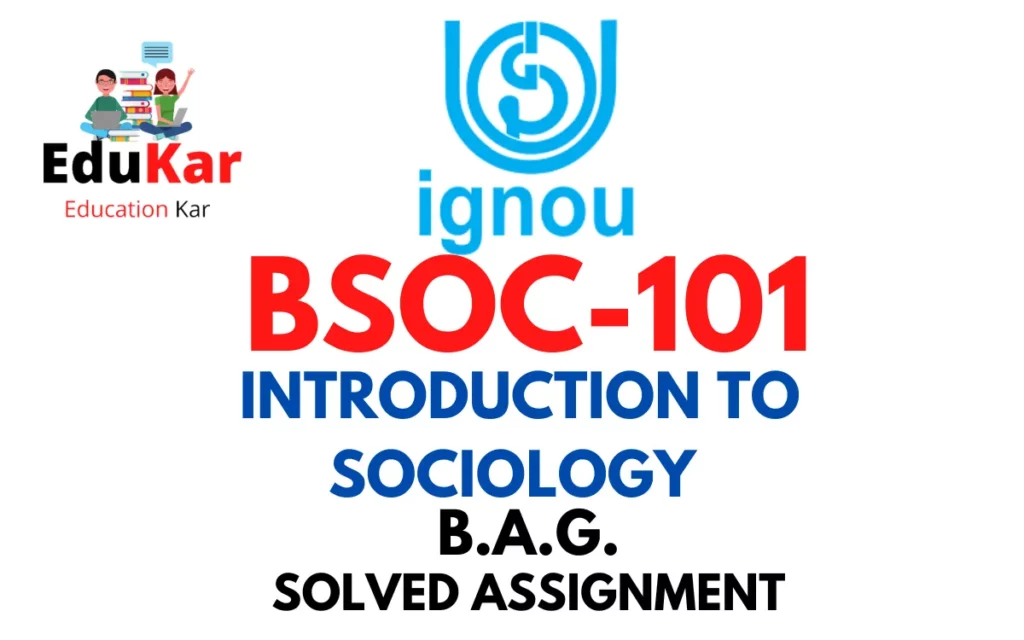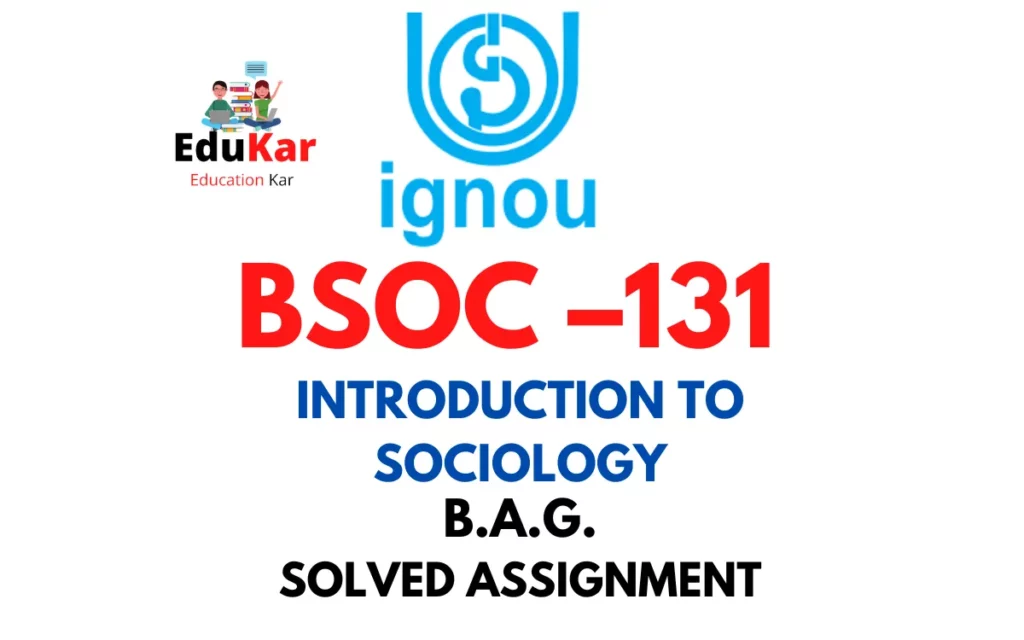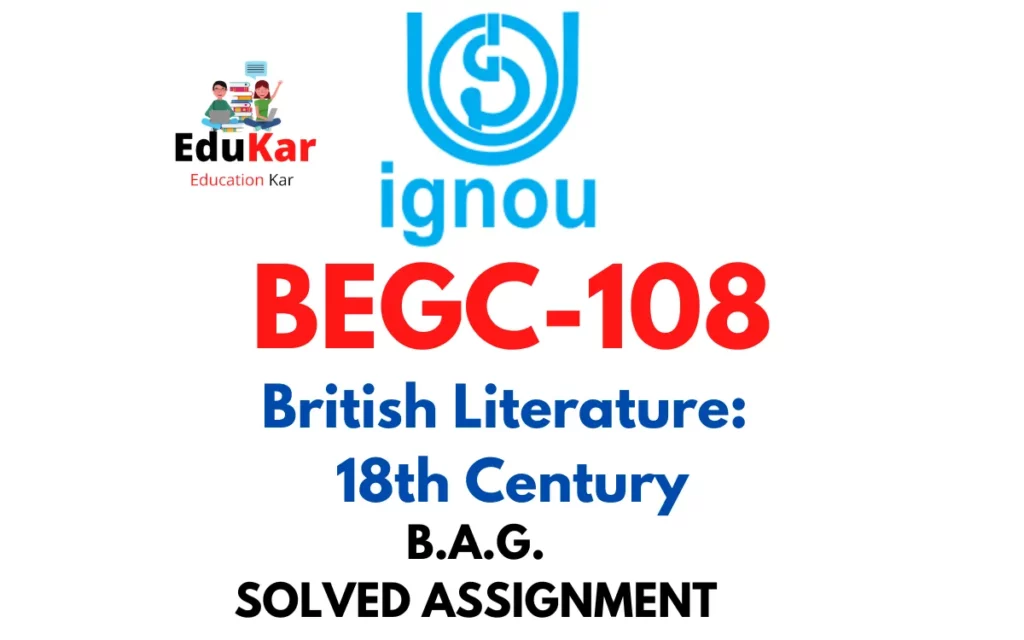Contents
- 1 Section A
- 2 Write short notes in about 100 words each:
- 3 (i) Epic
- 4 (ii) Unity of Action
- 5 Reference to the Context in about 100 words each:
- 6 (i) “… This proclamation I address to all:-Thebans, if any knows the man by whomLaius, son of Labadacus, was slain,I summon him to make clean shrift to me.”
- 7 (ii) “…What happened after that I cannot tell,Nor how the end befell, for with a shriekBurst on us Oedipus; all eyes were fixedOn Oedipus, as up and down he strode,Nor could we mark her agony to the end”.
- 8 Section B
- 9 Answer the following in about 350 words each:
- 10 1. Write a note on the different facets of war that is highlighted in the Iliad.
- 11 2. Does Oedipus Rex resonate with us even today? Discuss.
- 12 3. Does Euclio get integrated into society at the end of the Pot of Gold? Comment.
- 13 4. Examine the satire as a genre.
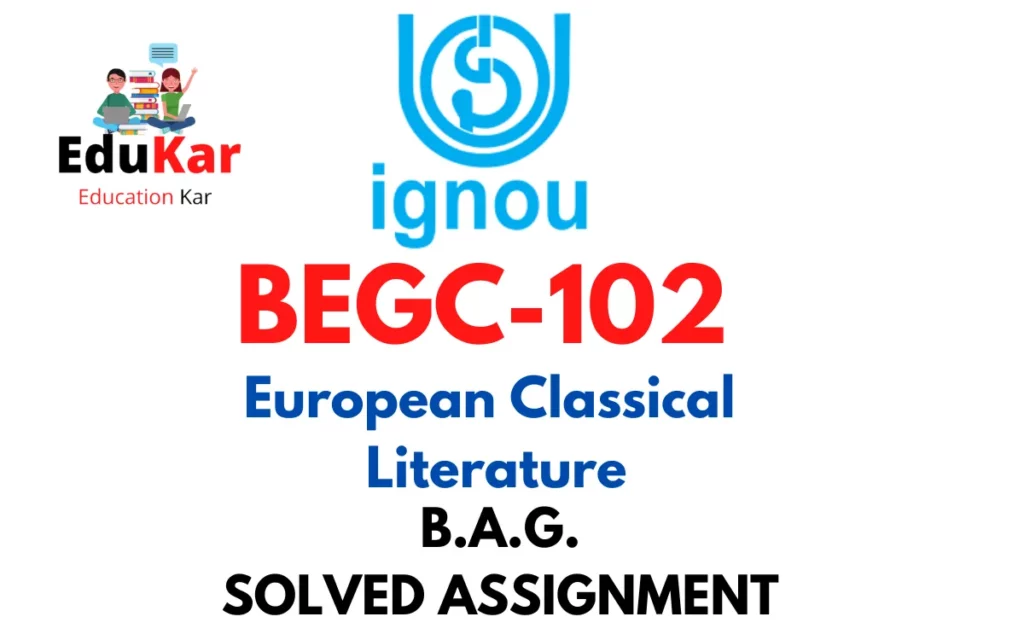
| Title | BEGC-102: IGNOU BAG Solved Assignment 2022-2023 |
| University | IGNOU |
| Degree | Bachelor Degree Programme |
| Course Code | BEGC-102 |
| Course Name | European Classical Literature |
| Programme Name | Bachelor of Arts (General) |
| Programme Code | BAG |
| Total Marks | 100 |
| Year | 2022-2023 |
| Language | English |
| Last Date for Submission of Assignment: | For June Examination: 31st April For December Examination: 30th September |
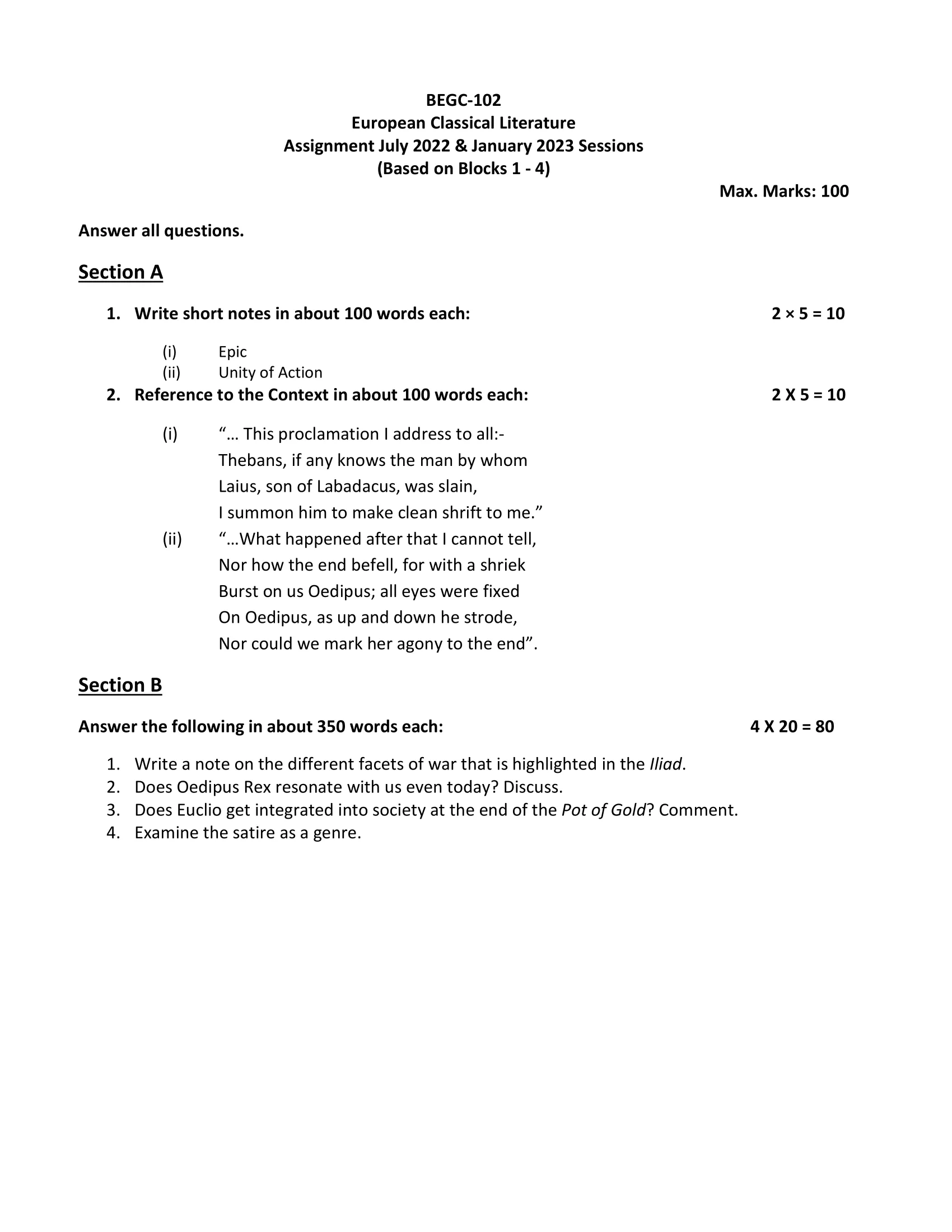
Section A
Write short notes in about 100 words each:
(i) Epic
Ans: Epic: An epic is a long narrative poem that tells the story of heroic deeds and events of a culture or nation. These poems often involve legendary or mythological figures and are designed to inspire and entertain audiences. Epics are typically written in a grand, elevated style and may incorporate supernatural elements, such as gods or magic. Some of the most famous examples of epic poetry include the Iliad and the Odyssey by Homer, the Ramayana and Mahabharata from India, and the Aeneid by Virgil.
(ii) Unity of Action
Ans: Unity of Action is a principle of dramatic structure in literature, particularly in the form of plays. It requires that a play should have one main plot or storyline, and that all the elements of the play should contribute to the development of that plot. This means that all subplots, characters, and events in the play should be related to the central plot and work together to create a cohesive and meaningful whole. Unity of Action is considered essential to the effectiveness of a play, as it helps to focus the audience’s attention and creates a sense of coherence and purpose. It was first introduced by Aristotle in his Poetics, a seminal work on literary theory.
Reference to the Context in about 100 words each:
(i) “… This proclamation I address to all:-
Thebans, if any knows the man by whom
Laius, son of Labadacus, was slain,
I summon him to make clean shrift to me.”
Ans: This statement is a proclamation made by Oedipus, the king of Thebes, from the play “Oedipus Rex” by Sophocles. The statement refers to the murder of King Laius, and Oedipus is declaring that he wants to find the person responsible for the murder. He is calling upon all Thebans who have information about the murderer to come forward and confess. The phrase “make clean shrift” refers to confessing and acknowledging one’s guilt. This proclamation sets the stage for the investigation that follows, leading to the unraveling of the tragic truth about Oedipus himself.
(ii) “The genetic code is the set of instructions that tells cells how to build proteins, which are essential to life. Each protein is made up of a unique sequence of amino acids, which are encoded by the DNA sequence of the corresponding gene.”
This passage describes the genetic code, which is a set of instructions found in all living organisms that provides the blueprint for the creation of proteins. Proteins are crucial building blocks of life, responsible for many functions within the body, including metabolism, communication, and defense. The genetic code is comprised of the DNA sequence that encodes the sequence of amino acids that make up each protein. This code is essential for life, and any changes or mutations to the code can have significant impacts on an organism’s health and development. The understanding of the genetic code has led to many advancements in medicine, including the development of personalized therapies based on an individual’s unique genetic makeup.
(ii) “…What happened after that I cannot tell,
Nor how the end befell, for with a shriek
Burst on us Oedipus; all eyes were fixed
On Oedipus, as up and down he strode,
Nor could we mark her agony to the end”.
Ans: This passage is from the play “Oedipus Rex” by Sophocles and describes the moment when Oedipus discovers the terrible truth about his own identity. The passage suggests that something dramatic and shocking has just happened, but the speaker cannot explain it fully. The speaker describes how Oedipus suddenly burst into the room, and everyone’s attention was fixed on him. He paced up and down, but the speaker could not see the agony of the woman in the room until the end. This passage is part of the climactic scene of the play where Oedipus learns that he is responsible for the murder of his father and the incestuous relationship with his mother. The description of Oedipus’s emotional turmoil and the use of vivid language create a sense of tension and shock, conveying the magnitude of the revelation that has just taken place.
Section B
Answer the following in about 350 words each:
1. Write a note on the different facets of war that is highlighted in the Iliad.
Ans: The Iliad, an ancient Greek epic poem attributed to Homer, highlights several different facets of war through its depiction of the Trojan War. This epic poem provides a vivid portrayal of the brutal and bloody nature of war, as well as the devastating consequences that it can have on individuals, families, and societies.
One of the key facets of war that is highlighted in the Iliad is the notion of heroism. The poem features several heroic characters, including Achilles, Agamemnon, and Hector, who are celebrated for their bravery, strength, and skill in battle. However, the Iliad also illustrates the darker side of heroism, as characters engage in ruthless and often morally questionable actions in the name of glory and honor. For example, Achilles’ quest for revenge against Hector leads to the Trojan prince’s brutal death, while Agamemnon’s pride and arrogance cause him to make decisions that have catastrophic consequences for his own army.
Another important facet of war that is depicted in the Iliad is the human cost of conflict. The poem is filled with scenes of death, injury, and grief, as characters on both sides of the war suffer the consequences of their actions. The Iliad is also notable for its portrayal of women and their experiences during war. While they are often relegated to the sidelines, the poem shows the devastating impact that war can have on women and children, who are left behind to mourn the loss of their loved ones.
The Iliad also explores the concept of fate and how it plays a role in war. The idea of fate is central to many of the characters’ actions, and the poem suggests that even the greatest heroes are ultimately subject to the whims of the gods. This idea is perhaps best illustrated by Achilles, who is told that he can either choose a long life without glory or a short life with eternal fame. Achilles ultimately chooses the latter, knowing that his death is predetermined.
Finally, the Iliad also highlights the role of leadership in war. The poem shows how the decisions of kings, generals, and other leaders can have a profound impact on the outcome of battles and the fate of entire armies. In many cases, the actions of these leaders are motivated by personal ambition, pride, or the desire for revenge, rather than a genuine concern for the welfare of their soldiers.
2. Does Oedipus Rex resonate with us even today? Discuss.
Ans: Oedipus Rex, the ancient Greek tragedy written by Sophocles, still resonates with us today due to its exploration of timeless themes and its ability to speak to the human experience. The play tells the story of Oedipus, a man who unwittingly kills his father and marries his mother, only to discover the truth and suffer the devastating consequences of his actions. Here are some reasons why the play still resonates with us today:
Firstly, the play addresses the theme of fate and free will, which continues to be a relevant and thought-provoking topic. Oedipus believes that he can escape his fate by leaving his home, but ultimately ends up fulfilling the prophecy that he was trying to avoid. This raises questions about whether our lives are predetermined, or whether we have the ability to shape our own destiny. This existential dilemma continues to fascinate and challenge us today.
Secondly, the play explores the concept of self-discovery and the search for truth, which is a universal human experience. Oedipus is on a quest to uncover the truth about his identity, and the more he learns, the more he suffers. His journey can be seen as a metaphor for the human experience of seeking knowledge and understanding, even if it leads to painful realizations. The play also illustrates how ignorance can be bliss, but ultimately, the pursuit of truth is more important.
Thirdly, the play highlights the human desire for control and the dangers of pride and hubris. Oedipus is a powerful and respected leader, but his arrogance and overconfidence lead to his downfall. His belief that he can solve the mystery of his own identity, despite the warnings of others, is a cautionary tale about the dangers of unchecked power and the need for humility and self-reflection.
Finally, the play also speaks to contemporary issues such as family relationships, social hierarchies, and the consequences of one’s actions. The story of Oedipus has been adapted and reimagined countless times in literature, film, and popular culture, demonstrating its enduring relevance and appeal to modern audiences.
3. Does Euclio get integrated into society at the end of the Pot of Gold? Comment.
Ans: “The Pot of Gold” is a play by the ancient Roman playwright, Plautus. It tells the story of a poor old man named Euclio who discovers a pot of gold and becomes obsessed with protecting it. The play is a comedy that satirizes greed, corruption, and social norms of ancient Roman society.
At the end of the play, Euclio is reunited with his daughter Phaedria, who had been kidnapped by a slave named Staphyla. In the final scene, Euclio and Phaedria are reconciled, and Euclio reveals the location of the pot of gold to her. He then declares that he will use the money to buy himself a new cloak and integrate into society.
However, it is unclear whether Euclio’s integration into society is successful. Throughout the play, Euclio is depicted as an outcast and a social misfit. He is paranoid and mistrustful of others, and he is constantly at odds with the other characters in the play. His obsession with the pot of gold has isolated him from society and caused him to become even more suspicious and paranoid.
While Euclio’s decision to use the money to buy a new cloak and integrate into society may seem like a positive step, it is not clear whether he will be able to overcome his mistrust and paranoia. Moreover, his newfound wealth may cause others to view him with suspicion or envy, leading to further isolation and mistrust.
4. Examine the satire as a genre.
Ans: Satire is a literary genre that uses humor, irony, and exaggeration to critique and expose the flaws, follies, and vices of society, individuals, or institutions. The goal of satire is to provoke thought and stimulate change by ridiculing and challenging social norms and behaviors. Satire has been used for centuries by writers and artists to comment on political, social, and cultural issues. It is a powerful tool for exposing hypocrisy and injustice, and it has played a significant role in shaping public opinion and contributing to social change.
Satire is often used to express a sense of moral outrage or indignation. By using humor and exaggeration, satirists can make their criticism more palatable and engaging, allowing them to reach a broader audience. Satire can take many forms, including novels, plays, poems, cartoons, and films, and it can be subtle or explicit, depending on the intentions of the author.
One of the key features of satire is the use of irony. Irony is a figure of speech in which the intended meaning is opposite to the literal meaning of the words. Satirists use irony to highlight the discrepancy between what is said and what is actually meant, often revealing the hypocrisy and absurdity of certain behaviors or beliefs. Irony is also a useful tool for exposing the flaws and contradictions in society, revealing the gap between what people say and what they do.
Another common feature of satire is exaggeration. Satirists often take a small or trivial problem and blow it out of proportion, making it seem much more significant and ridiculous than it really is. This is called hyperbole, and it is used to expose the absurdity of a particular situation or behavior. By exaggerating the problem, the satirist can draw attention to it and encourage people to take action to address it.
How to Download BEGC-102 Solved Assignment?
You can download it from the www.edukar.in, they have a big database for all the IGNOU solved assignments.
Is the BEGC-102 Solved Assignment Free?
Yes this is absolutely free to download the solved assignment from www.edukar.in
What is the last submission date for BEGC-102 Solved Assignment?
For June Examination: 31st April, For December Examination: 30th October


